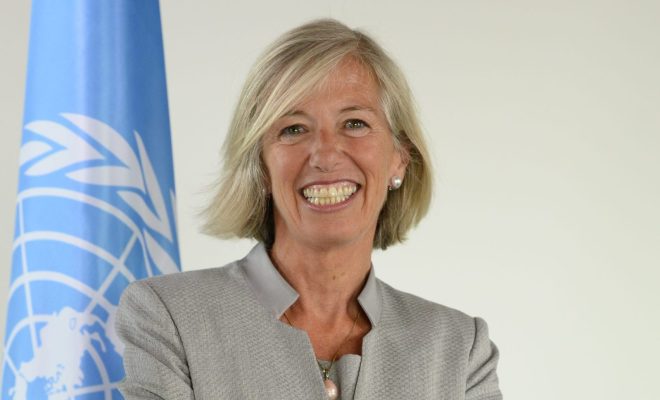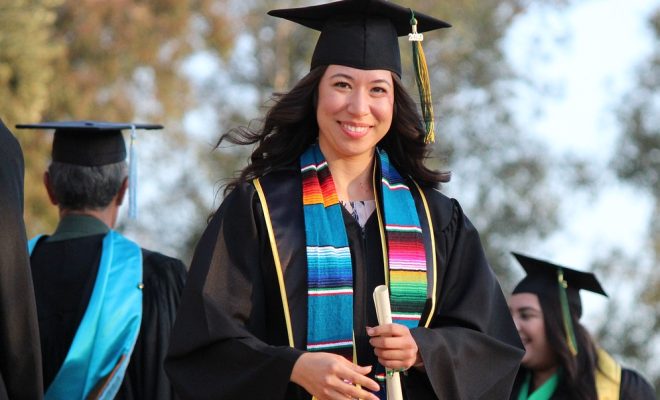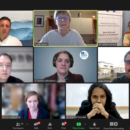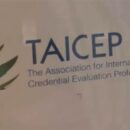The New Regional Convention from the perspective of the Latin American university

Only 1 in 10 students in Latin America travel abroad; two out of three go to developed countries in North America and Western Europe, and only one stays in the region. Only half of the students who go abroad have expectations of returning home. The region’s mobility figure, with only 1.1% of students having the opportunity to go abroad, is low compared to the world average, which is more than double. Francesc Pedró, director of IESALC, insists on the need for this figure to increase: “Going through a mobility experience transforms life”.
To this end, he presented three calls for action: 1) increase the investments shared by intra-regional networks (80% of research funds used for international cooperation come from the EU), 2) implement the New Regional Convention to standardize and enable mobility processes and protect student interests, 3) improve opportunities for mobility and increase public and private investment. “IESALC can make two contributions: a free course on academic mobility and the advantages of the regional convention, and support the creation of academic mobility information centers so that they have accurate, useful and updated data”.
Thus on June 15, 2021, began the II Virtual Forum on the New Regional Convention, which summoned Olda María Cano de Araúz, Vice Rector of the Universidad Autónoma de Chiriquí (Panama) and member of the Governing Council of UNESCO IESALC; Carmela Chávez Irigoyen, specialist in Comparative Educational Systems at the National Superintendency of Higher Education of Peru (SUNEDU, Peru) and David Julien, Executive Secretary General of the Inter-American Organization for Higher Education (IOHE) to a dialogue moderated by José Antonio Quinteiro (JAQ), Program Coordinator of UNESCO IESALC.
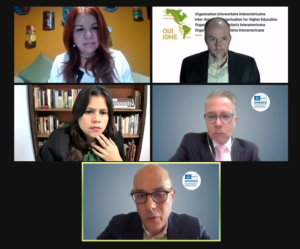
From left to right Olda Cano, David Julien, Carmela Chávez Irigoyen, José Antonio Quinteiro and Francesc Pedró.
JAQ: If the recognition of degrees and diplomas in higher education favors academic mobility and the circulation of talent, driving force for the economic and cultural development of our peoples, why has the ratification of the New Regional Convention and of the Global Convention taken so long?
Olda María Cano de Araúz (OMC): The delay in ratification has to do with a lack of knowledge, as well as the authors’ lack of coordination. It also has to do with the fear of displacement of national professionals by international ones. However, we must see mobility as a possibility of economic development for the countries and the region and as one of the pillars and strategic axes of the universities.
Carmela Chávez Irigoyen (CCI): The recognition of foreign studies has been a constant concern because we are a country that receives immigrants. In Peru, SUNEDU is responsible for reviewing the origin and equivalency of degrees, while universities are responsible for revalidations. There are concerns about the legality of the degrees because there is no regional system to confirm their origin, and fears about equivalencies and the quality of the studies of the new social groups that arrive. In this context, recognition is an important mechanism for social insertion.
David Julien (DJ): Resistance is normal before opening the doors in these processes, and the big challenge is to have a balanced system on a national scale. Factors such as employability, coverage services, and guaranteeing quality to citizens must be taken into account, and this implies a level of complexity that goes beyond the good faith of recognizing diplomas.
JAQ: Given the prejudices about the quality of diplomas accredited by a national and external body, do you think it would be advisable to leave professional accreditation aside in a first instance, and only deal with the recognition of academic diplomas for purposes other than professional accreditation?
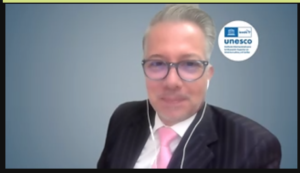
José Antonio Quinteiro, program coordinator at UNESCO IESALC
OMC: I think we should be more visible at the regional level, develop networks, and get to know each other better in order to achieve recognition. I believe that through diversity and working together we will consolidate higher education in the region.
CCI: You have to build trust, for which you need a multi-stakeholder dialogue. One of the pillars of that trust is quality, and training levels must be raised in order to raise the level of our countries. In order to build trust, we need to establish order, which gives legality to the offer and to the system, as in Peru, where there are public databases on the Internet to validate credentials.
DJ: In order to focus on quality, we need to be more flexible, to talk bilaterally. It is necessary to promote spaces for higher education institutions to get to know each other. At the IOHE we are committed to the eMOVIES virtual mobility space, which allows for bilateral work between institutions. Last year we had more than 1000 virtual trips, and this implies a great process of mobility with other learning processes, and with other experiences that enrich the training experience. eMOVIES has 113 institutions and more than 4000 courses.
JAQ: Wouldn’t the New Convention and its ratification reap rewards in favor of the University, which bears the greatest burden of the recognition processes? Why then have the universities been passive with respect to the support expected of them in favor of the ratification of this instrument?
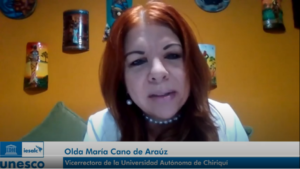
Olda María Cano, Vice Rector of the Universidad Autónoma de Chiriquí and member of the Governing Council of IESALC
OMC: We have to see it as a win-win equation. We have a virtual doctorate in Panama that has helped us academically with the participation of specialists from all over the world. We want that knowledge in our universities, with innovative teachers, and from other latitudes, working alongside national experts. Mobility must be seen as academic and not professional. We can gain a lot but we have to be visible and transparent.
CCI: Some organizations are afraid of entering into the New Regional Convention because it is an important transformation. It is a commitment to the right to education, to the construction of citizenship, to the consolidation of linked projects that will include citizenship and inter-culturality.
Alternative education and credentials
JAQ: Today there are many alternative credentials: nanodegrees, degrees obtained through MOOCs platforms, digital badges, and bootcamps, among others, that are recognized in the labor market, but not by public universities, and are de-merited in the competitive examinations of public administrations in relation to official degrees. How could the New Convention make a first approach to achieve consensus on the recognition of these alternative degrees?
OMC: The pandemic has made us look at higher education from other perspectives. These ways of learning – through MOOCs, bootcamps, digital badges – are our calling card in the world of digital training. There are free courses that demand a lot from the learner because they dabble in critical thinking and lifelong learning. We have to look for ways for the New Convention to take them into account as part of higher virtual education.
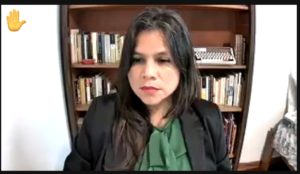
Carmen Chávez Irigoyen, specialist in Comparative Educational Systems, SUNEDU, Peru
CCI: These new forms of alternative education can be considered as complementary, like the extension courses. The Convention can be complemented within a broader public education policy framework. For example, to have a National Qualifications Framework that would enable to establish not only equivalencies between degrees, but also in terms of learning and competencies, which would allow for more dynamic training systems. The various instruments allow dialogue and articulation, guaranteeing quality, when the competencies between the various systems are understood, and this will not only allow mobility but also the interaction of knowledge.
DJ: Traditionally, organizations like ours, with an institute in university leadership, issued a certificate or a PDF record, and now we have digital badges with monitoring or tracking. We work to recognize specific digital competences and have worked across faculties and networks to advance mutual recognition mechanisms.
JAQ: In 2018, EU education ministers declared that by 2025 there would be automatic recognition of degrees in the European Higher Education Area. What do we lack or what do we have in excess in order to make quantum leaps in the recognition process, although not with the pretension of reaching the advances shown by the European Area, but a stage closer to it in terms of the recognition of academic degrees?
OMC: We must develop shared information systems, such as accreditation and quality assurance systems, which are transparent and open to university institutions. Latin America must open up and project itself more to move forward and grow with all the diversity of mechanisms that exist in Europe.
CCI: Information systems in Europe are in dialogue with each other and it has been possible to implement a homogeneous system accompanied by a process of integration at the level of coordination in quality assessment, and with national systems that dialogue on their standards and mechanisms. There is a need to assess integration processes, where they exist, with other variants, such as migration and bureaucratic difficulties.
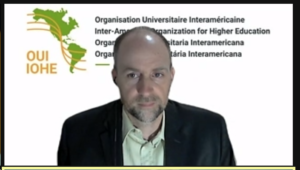
David Julian, Executive Secretary General of the Inter-American Organization for Higher Education
DJ: The strengthening of virtual mobility is a tool that will make it possible to reduce the talent drain to which Francesc Pedró alluded. Promoting the “mobility of knowledge” may be the answer to the search for regional recognition.
At the close of the Forum, Quinteiro took the opportunity to highlight and thank Peru and Argentina for having a complete registry of university degrees, open to the public, issued by higher education institutions in their countries, an indispensable tool for confirming the validity of tertiary education credentials. During the event, expressions of political will were received from the governments of Cuba, Nicaragua and Venezuela announcing the imminent and forthcoming ratification of the New Convention by these signatory states.
In conclusion, he stressed that the region needs the ratification of the New Convention in order to provide higher education with the necessary tools for the growth of the societies and of the countries themselves. But, in order to achieve this, it is urgent for the network between them to be strengthened in favor of a more effective and direct communication towards an open and transparent dialogue for the implementation of reforms and contributions to the university education system.
RELATED ITEMS
